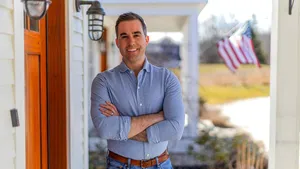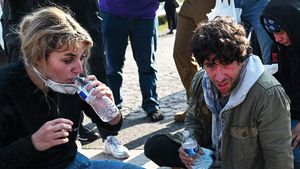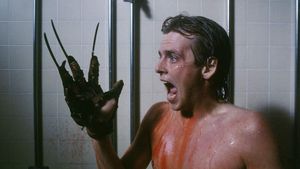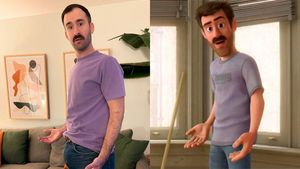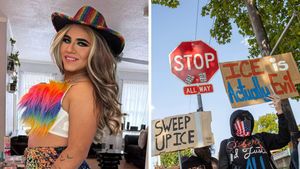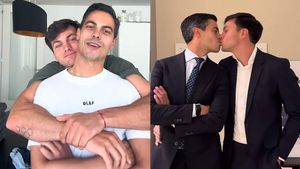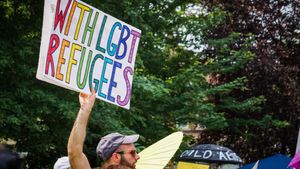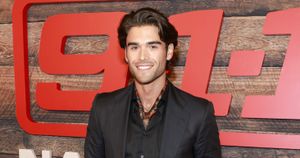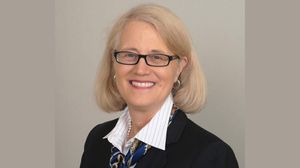Treatment GuideJust DiagnosedSex & DatingAfrican AmericanStigmaAsk the HIV DocPrEP En EspañolNewsVoicesPrint IssueVideoOut 100
CONTACTCAREER OPPORTUNITIESADVERTISE WITH USPRIVACY POLICYPRIVACY PREFERENCESTERMS OF USELEGAL NOTICE
© 2025 Pride Publishing Inc.
All Rights reserved
All Rights reserved
By continuing to use our site, you agree to our Privacy Policy and Terms of Use.
In March 2003 the Reverend Roderick Hennings, pastor at Zion Dominion Church in Buffalo, N.Y., devoted his sermon to HIV and AIDS. Then he practiced what he preached'he took an HIV antibody test in front of his entire congregation. Hennings was taking part in Breakthrough Sunday, an effort that began in New York State to bring HIV testing and education to African-American churches. And it worked. At the end of Hennings's service about 300 members of his church followed his example and were tested for HIV. As HIV continues to spread rampantly among African-Americans [see accompanying article, 'Disturbing Statistics'], it has become increasingly clear that the black church has a unique role to play in fighting the epidemic. 'Church is central in our community,' explains Pernessa Seele, founder of the Balm in Gilead, a nonprofit organization formed in 1988 to teach faith leaders about HIV and AIDS. 'It's not just where people go on Sunday; it's a community center. It is where we organize around social and cultural issues.' And people listen to what the church says, Seele adds: 'When the church says go right, people go right. And when it says go left, people go left.' No one knows this better than Vanessa D. Sharp. She was raised in the black church with a father who was a Presbyterian minister, and the church was Sharp's family'and her home. That is why, when Sharp learned she was HIV-positive in 1990, the first thing she did was pray. But she had to pray alone. 'I had heard that my pastor had turned his back on people who had HIV because he thought all people with HIV were gay,' she says. She knew his attitude permeated the beliefs of almost everyone in the church. Today, responding to what she says was God's call, Sharp not only speaks openly about having HIV but is also a divinity student at the Interdenominational Theological Center in Atlanta, a historically African-American school. It was Sharp's interest in seeing how far the church has come in responding to HIV, along with her desire to have her own HIV ministry, that led her to join more than 100 pastors, deacons, and other church leaders in Atlanta last October for a one-day workshop, 'Successful Ministry in the Age of AIDS.' The workshop was specifically designed to provide faith leaders with medically accurate information on HIV prevention, education, and treatment. 'We wanted to give people information that would allow them to stretch their ministry by taking this medically based information and then applying it in a faith-based setting,' says Mary Hess of Minority Health Care Communications, which coordinated the conference. The Balm in Gilead has a similar goal. Its flagship program, the Black Church Week of Prayer for the Healing of AIDS, which will take place March 7'13, now involves more than 10,000 churches and is estimated to reach more than 2.5 million African-Americans. Its educational arm'the Black Church HIV/AIDS Training Institute and Black Church HIV/AIDS Network'creates ongoing opportunities for leaders of church-based HIV programs to share information about their work. Tendai Lynch, who chairs the six-year-old HIV ministry at the First Baptist Church in Norfolk, Va., is one of the network's members. The ministry works with other churches and the local AIDS hospice to provide support to people with AIDS. The members also offer prevention education programs at the church for teens, adults, and seniors. Lynch believes the most important message her church needs to send is that its attitudes have changed. 'People think that once they reveal they are HIV-positive or that someone in their family is suffering from AIDS, other people will not treat them the same,' she says. 'As a church, we are trying to say, 'No, we won't treat you any different.' So we tell our congregation to get tested and'if you find out you are positive'to start seeing a doctor and start taking medication. We will still love you.' Nettie Butler, an HIV educator at Springfield Baptist Church in Thomson, Ga., is also a member of the Black Church HIV/AIDS Network. Butler says her goal in being part of the group is to get HIV education into the community in as many ways as possible. Not only does she teach classes at the church, she says, but when 'we do street-walking witnessing about Jesus, we also shoot some talk about HIV in between that.' Butler believes 'God called me to do this work.' Her efforts were also inspired in part by her gradual realization that her brother, who died in 1986, 'probably didn't die because of a heart attack but because of AIDS. Plus,' she adds, 'the church is so blind. Leaders don't want to talk about HIV, and where I live now is a very rural area, so there's a lot of denial out here. And seeing those statistics [about African-Americans and HIV] just blew my mind.' In 2003, Butler worked with her pastor to plan educational programs during the Black Church Week of Prayer. These activities included placing a banner reading 'AIDS hits the faimily' across the main street of Thomson'the first time anything like that had ever been done in the area. Virtually all pastors now working to address HIV have had to come to terms with how they have dealt with HIV in the past. 'There are incredible stories pastors tell about seeing the light only after blindness'sermons where the congregation is invited to bear witness to the pastor's pain,' says Robert Fullilove III, Ed.D., an associate professor at the Mailman School of Public Health at Columbia University and an expert on HIV and minority health. 'The text in the New Testament says the greatest sin is to deny someone grace or forgiveness or to turn someone away in an hour of need. And when a pastor acknowledges that he has done that, it is a powerful experience.' For Reverend Hennings, that turning point came just two years ago. Prior to that, he says, his sermons addressed HIV only 'lightly.' But then he met four HIV-positive men from Buffalo who explained to him what it felt like to not get any support from the church. 'These men opened my eyes,' he says, 'and they made me realize that the church needed to take the stigma off HIV and to look at it as a disease and not a behavioral manifestation.' Vanessa Sharp still thinks about the pastor she could not turn to when she needed him most. 'Since leaving that church, I have been able to be open about my HIV status in other ministries,' she says. 'But I still have the desire to go back to speak with that pastor. And I know that that is something that will soon come to pass.' Because, Sharp knows, what that pastor says will influence his entire congregation.
From our Sponsors
Most Popular
BREAKING: Supreme Court rules to save free access to preventive care, including PrEP
June 27 2025 10:32 AM
Thanks to U=U, HIV-positive people can live long, happy, healthy lives
July 25 2025 2:37 PM
Plus: Featured Video
Latest Stories
Amazing People of 2025: Javier Muñoz
October 17 2025 7:35 PM
It’s National PrEP Day! Learn the latest about HIV prevention
October 10 2025 9:00 AM
“I am the steward of my ship”: John Gibson rewrites his HIV narrative
September 16 2025 2:56 PM
“So much life to live”: Eric Nieves on thriving with HIV
September 03 2025 11:37 AM
The Talk: Owning your voice
August 25 2025 8:16 PM
The lab coat just got queer
August 21 2025 10:00 AM
Messenger RNA could be the key to an HIV vaccine — but government cuts pose a threat
August 20 2025 8:02 AM
The Talk: Beyond the exam room
August 13 2025 3:15 PM
The Talk: Navigating your treatment
August 01 2025 6:02 PM
The Talk: Starting the conversation
July 25 2025 4:47 PM
How the Black AIDS Institute continues to fill in the gaps
July 25 2025 1:06 PM
“I felt like a butterfly”: Niko Flowers on reclaiming life with HIV
July 23 2025 12:22 PM
Dancer. Healer. Survivor. DéShaun Armbrister is all of the above
July 02 2025 8:23 PM
1985: the year the AIDS crisis finally broke through the silence
June 26 2025 11:24 AM
VIDEO: A man living with HIV discusses his journey to fatherhood
June 10 2025 4:58 PM
Trump admin guts $258 million in funding for HIV vaccine research
June 03 2025 3:47 PM
Grindr is reminding us why jockstraps are so sexy and iconic
May 02 2025 5:36 PM
HRC holds 'die-in' to protest Trump health care cuts
April 28 2025 2:11 PM































